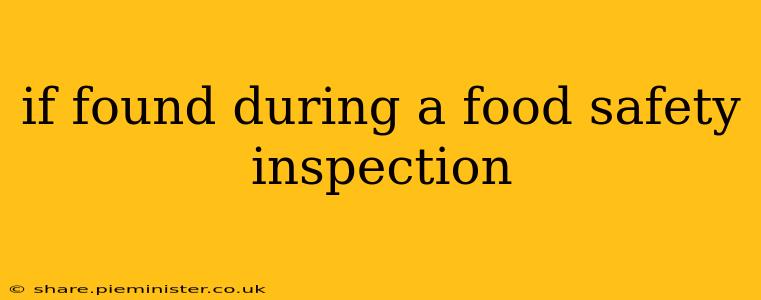What Happens if Violations Are Found During a Food Safety Inspection?
Food safety inspections are crucial for protecting public health. These routine checks ensure that restaurants, food processing plants, and other food businesses maintain sanitary conditions and follow safety regulations. However, what happens if violations are found during a food safety inspection? The consequences can vary significantly depending on the severity and nature of the violations. This comprehensive guide explores the potential outcomes, from minor warnings to severe penalties and even business closure.
What are the common violations found during food safety inspections?
Common violations uncovered during food safety inspections often revolve around critical control points within the food handling process. These can include:
- Temperature control failures: Improper storage temperatures for potentially hazardous foods (like meat, poultry, and dairy) are a frequent culprit. This can lead to rapid bacterial growth and foodborne illness.
- Pest infestations: The presence of rodents, insects, or other pests indicates a lack of sanitation and poses a significant risk of contamination.
- Poor personal hygiene: Employees not washing their hands properly, wearing appropriate attire (like gloves and hairnets), or exhibiting other unsanitary practices can contaminate food.
- Improper food handling: This encompasses a range of practices, including cross-contamination (transferring bacteria from one food to another), inadequate cooking temperatures, and improper storage of raw ingredients.
- Lack of proper documentation: Failure to maintain accurate records of food temperatures, supplier information, or employee training can raise concerns about overall food safety protocols.
What are the consequences of failing a food safety inspection?
The consequences of failing a food safety inspection depend on the severity of the violations. Minor infractions often result in a warning and a plan for improvement. More serious violations can lead to:
- Written warnings: These serve as official documentation of the infractions and require the business to rectify the issues within a specified timeframe. Repeat offenses typically lead to more stringent measures.
- Fines: Monetary penalties can range from modest amounts for minor violations to substantial fines for repeated or severe breaches of regulations. The amount of the fine usually correlates with the severity and number of violations.
- Temporary closure: For serious violations posing an immediate threat to public health, a temporary closure order might be issued until the problems are addressed and the facility passes a re-inspection.
- Permanent closure: In extreme cases of repeated, egregious violations or negligence that demonstrates a blatant disregard for food safety regulations, a business could face permanent closure. This is a last resort, reserved for situations where the risk to public health is exceptionally high.
- Legal action: In cases of severe negligence leading to foodborne illness outbreaks, legal action, including lawsuits and criminal charges, could be taken against the business owner or management.
What happens if I have a critical violation during a food safety inspection?
A critical violation is any infraction that directly impacts food safety and presents an immediate health risk. These violations demand immediate attention and correction. Examples include inadequate cooling procedures, improper handwashing, and evidence of pest infestation. A critical violation will almost certainly lead to a follow-up inspection to ensure the problem has been rectified. Failure to address critical violations promptly can result in temporary closure and significant fines.
How can I prepare for a food safety inspection?
Proactive measures are key to ensuring a successful inspection. This includes:
- Implementing a comprehensive food safety program: This should encompass staff training, regular sanitation practices, temperature monitoring, and thorough documentation of all food handling procedures.
- Maintaining accurate records: Keep detailed logs of food temperatures, supplier information, employee training, and any pest control measures.
- Regular staff training: Employees need to be well-versed in food safety practices, including proper handwashing, cross-contamination prevention, and safe food handling techniques.
- Conducting regular self-inspections: This proactive approach identifies potential issues before inspectors arrive, allowing for timely correction.
By understanding the potential outcomes of failing a food safety inspection and proactively implementing robust food safety measures, businesses can protect their customers, maintain their reputation, and avoid costly penalties. Remember that food safety is not just a regulatory requirement—it's a fundamental responsibility to ensure the well-being of consumers.
